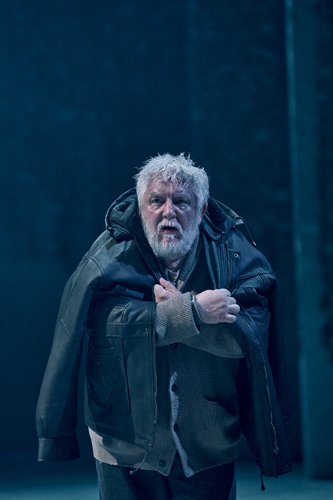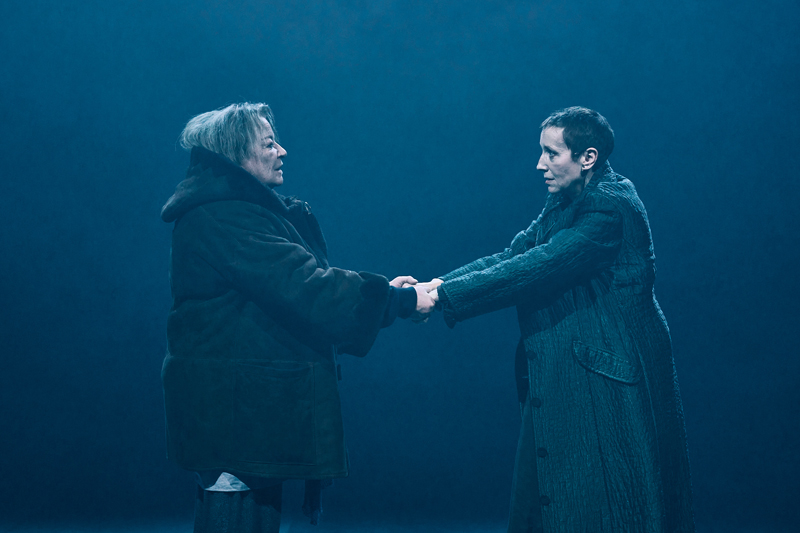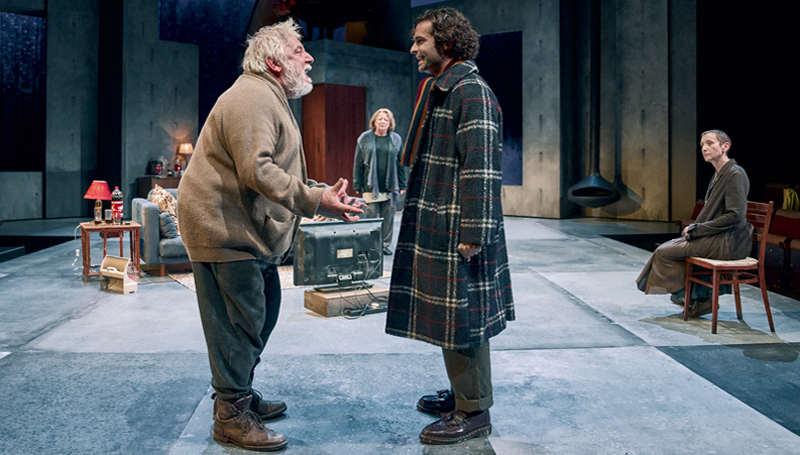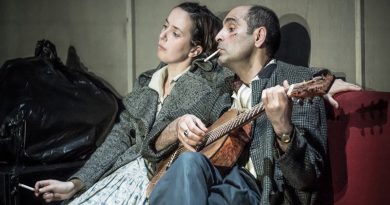“John Gabriel Borkman”, Bridge Theatre
Neil Dowden on the South Bank
5 October 2022
Ibsen certainly lives up to his reputation for gloominess in his penultimate play John Gabriel Borkman (1896). The titular character is a disgraced and deluded banker and entrepreneur, who has spent five years in prison for fraud but still dreams of a comeback. Not only has his megalomania ruined many investors, it has destroyed his relationships with his shamed wife Gunhild, her sister Ella (whom he used to love), and his estranged son Erhart.

Simon Russell Beale as the title character.
Photo credit: Manuel Harlan.
Uniquely in Ibsen, the action takes place in real time, over the course of one evening in Borkman’s mansion which is now owned by his sister-in-law – the one person whose money he did not speculate with. Although released eight years previously, Borkman has never set foot outside the house during this time, incarcerating himself in the top floor while Gunhild inhabits the lower floor listening to him pacing up and down “like a sick wolf in a cage”.
Ella visits to tell her that she is terminally ill and wants to leave her estate to Erhart, whom she took under her wing when Borkman’s financial scandal broke. She would like Erhart to take on her name. But Gunhild wants her son to restore the family’s reputation by paying off the debtors, while Borkman is counting on getting back into business with Erhart – who has his own plans to escape from the older generation’s suffocating grip.
Borkman himself is a fascinating, complex study of a man who deceives himself as well as others in his overreaching ambitions. A miner’s son who worked his way up to become an influential financier, Borkman is not simply a Charles Ponzi or Bernie Madoff trying to get rich, but someone who believes he can create wealth for multitudes – a Nietzschean superman for whom the usual rules don’t apply, regardless of the collateral damage caused.
The tone of the play can seem relentlessly grim, but it’s a powerful, elemental drama stripped back effectively in Lucinda Coxon’s new colloquial version which does include some moments of sardonic humour. Bordering on melodramatic, the broadly naturalistic style changes markedly in the last, short act that takes place outside in the snowy wilds around Oslo. This section looks forward to Ibsen’s final, experimental and expressionist work When We Dead Awaken – and offers a slight thaw in the hitherto wintry relationships.

Clare Higgins and Lia Williams.
Photo credit: Manuel Harlan.
Although the play’s claustrophobic atmosphere would be better suited to a more intimate venue, Nicholas Hytner’s modern-dress production compels our attention throughout its unbroken, one-and three-quarter-hour span. Anna Fleischle’s design features an impressive, brutalist interior that shifts slightly according to the perspective of upstairs/downstairs, including on a mezzanine level a piano used for playing Saint-Saëns’ Danse Macabre – what else? Through the blurry windows can be glimpsed a pristine snowy wood unsullied by human trespass.
We hear Borkman’s footsteps above for quite a time before Simon Russell Beale gives him a charismatic, brooding presence, bitter at his betrayal when he was so close to success and obsessed with grand schemes that are castles in the air. Likewise Clare Higgins’s angry Gunhild shows no pity for her husband’s victims, only for her own loss of social position, as she battles in sibling rivalry with Lia Williams’s quieter but equally strong-willed Ella over maternal rights. Sebastian De Souza’s Erhart is a commitment-free hedonist who prefers the company of Ony Uhiari’s independent-minded divorcee Fanny and Daisy Ou’s talented young pianist Frida. The latter’s father Vilhem, drolly played by Michael Simkins, may also be delusional in his hopes of publishing his novel but unlike Borkman is happy to see warm-blooded youth reaching for the sun.









